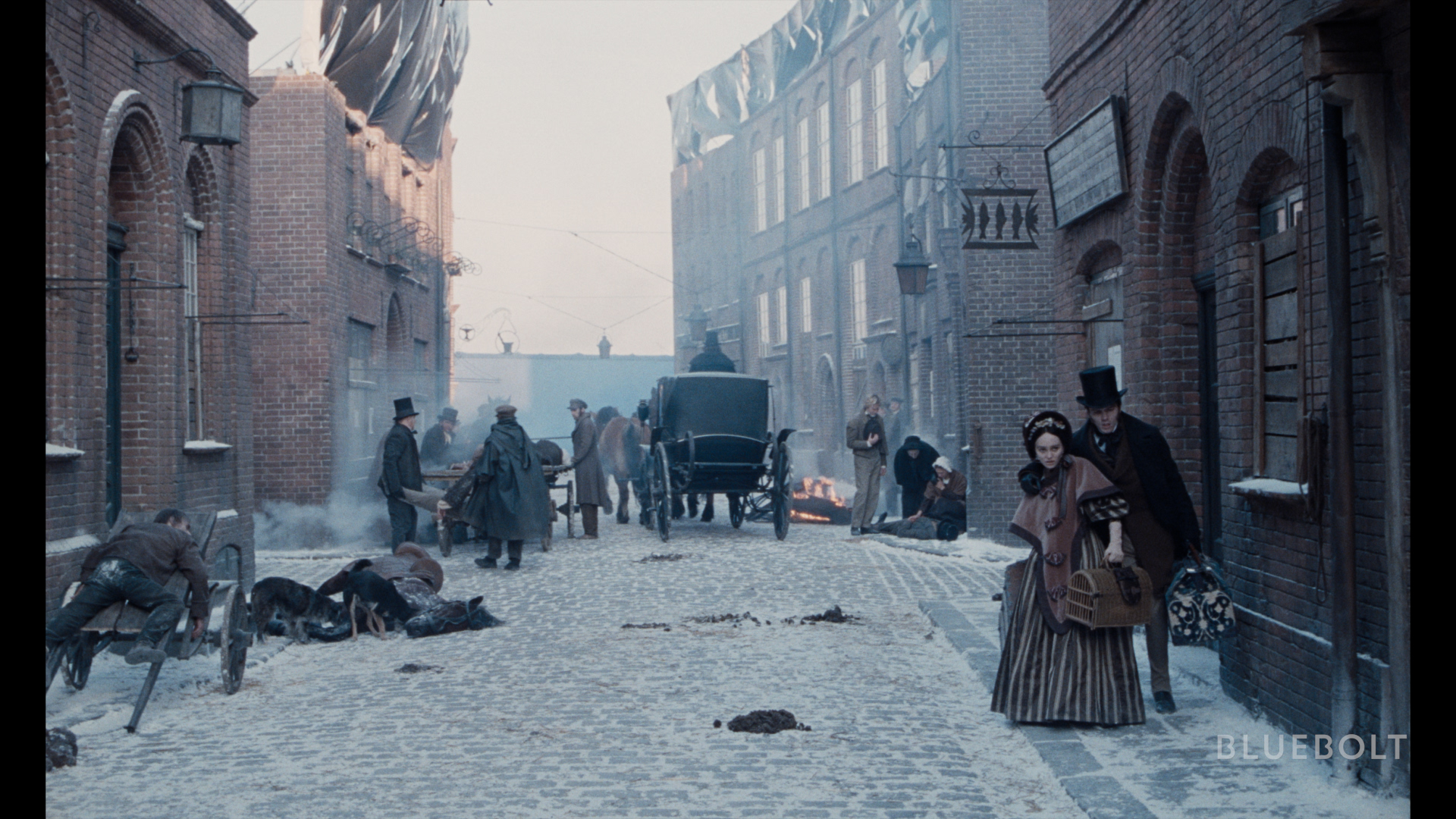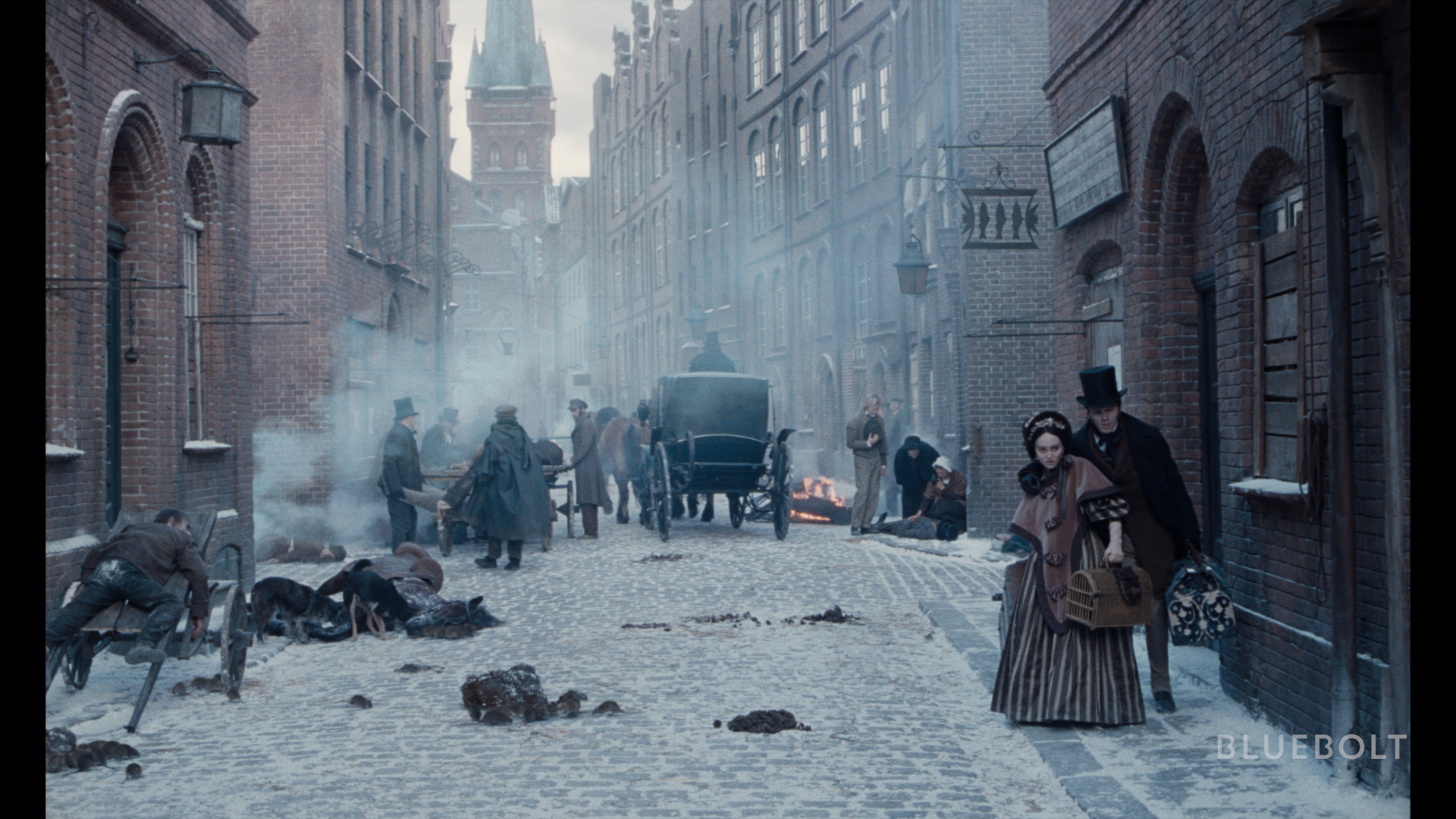Site: UK Screen Alliance
Urgent action needed to protect distinctly British content as MPs call on Government to ramp up support across film and high-end TV industry
The Culture, Media & Sport Committee has published the British film and high-end television report.

- Report outlines steps to maintain overseas investment while safeguarding culturally distinct British productions.
- Independent Film Tax Credit a game-changer but not a silver bullet for all the problems facing independent British film.
- Committee makes recommendations on tax incentives, supporting workforce, independent cinemas and meeting challenges posed by AI.
Tax breaks and a streamer levy should be on the table as part of an urgent package of support for the UK’s crisis-hit high quality drama sector, MPs say today, in a wide-ranging report which urges the Government to step up the assistance it provides for all elements of British film and high-end television.
Today’s report from the Culture, Media and Sport Committee welcomes the Government’s stated ambition to make the UK the best place to make film and high-end television, but warns that there must be no complacency over its status as a global production hub and calls for a regular assessment of tax incentives to maintain investment from overseas.
At the same time, the report recommends a series of measures to halt the decline of domestic production of culturally distinct British film and programmes, which has failed to keep pace with the headline-grabbing growth of big box office productions financed and controlled from outside the UK.
While the introduction last year of the Independent Film Tax Credit – as called for by the previous committee in the last Parliament – was a welcome first step for the film industry, the report says the Government should go further, or producers will continue to struggle to develop and raise finance for films, and those that are made will not be seen by audiences. The Committee calls for a tax credit to support the distribution of lower-budget films, among other measures to support independent film.
The Committee further warns that without urgent intervention, the problems seen in independent film will extend to the domestic high-end TV sector, where competition from high-budget overseas production is driving up costs, revenue models are changing due to the terms offered by streamers and commissioning budgets of public service broadcasters are being squeezed by a fall in the licence fee and drop in advertising revenue.
The report outlines evidence that this has put distinctly British content, which is vital to the UK’s identity, national conversations and talent pipeline, under threat.
Evidence to the inquiry from ‘Wolf Hall’ director Peter Kosminsky warned that recent hit ‘The Mirror and the Light’ would not have been made today due to funding challenges, while ‘Black Doves’ and ‘Kaos’ producer Jane Featherstone told the Committee that the business models of streamers dictate that shows need to have global appeal to be made.
The Committee’s report therefore calls for enhanced tax incentives for domestic high-end TV, and for streamers, such as Netflix, Amazon, Apple TV+ and Disney+, which benefit from the creativity of British producers, to put their money where their mouth is by committing to pay 5% of their UK subscriber revenue into a cultural fund to help finance drama with a specific interest to British audiences.
The report also makes a range of recommendations on how to bolster skills and worker rights in the industry, citing the many hardworking and talented people who work in the sector as a key reason for its success. It reinforces the recommendation of the last committee for the Government to appoint a Freelancers’ Commissioner.
On support for cinemas, the Committee says the Government should introduce a core funding model for culturally significant independent cinemas to mitigate the cost pressures, changing audience behaviours and under-investment in people and infrastructure that have threatened many communities’ cinemas.
The report also says that the Government should require licensing of creative works in all cases where they are used to train AI models.
Big box-office blockbusters made in Britain have showcased the UK’s world-class film and high-end television industry like never before. But the boom in inward investment of recent years now risks crowding out our many talented independent British producers. While streamers like Netflix and Amazon have proved a valuable addition for the industry and economy, unless the Government urgently intervenes to rebalance the playing field, for every ‘Adolescence’ adding to the national conversation, there will be countless distinctly British stories that never make it to our screens.
From independent production through to cinemas, all parts of our film and high-end TV sector, and the talented people that make it such a success, are going through a turbulent time. To neglect just one part puts the entire ecosystem at risk, so it’s therefore vital that the Government goes further and faster across the board to support an industry that is so important to both our economy and our soft power overseas.
Today’s report sets out a way forward for the Government to put the name of the UK film and television industry up in lights around the world as the very best place to do business and to work, by offering the right tax incentives, tackling skills shortages, improving worker rights and making sure the rise of AI is a positive force, not a disincentive to investment.
Dame Caroline Dinenage MP, Chair of the CMS Committee
The report’s key findings and recommendations
The future of British film – page 7
- The Independent Film Tax Credit is a gamechanger for domestic production and a welcome sign of continued Government commitment to the sector. But it is not a silver bullet for all the problems facing independent British film. Without further intervention, producers will still struggle to develop and raise finance for films, and the films that are made will not be seen by audiences.
- On tax changes, the report makes recommendations on amending the definition of R&D for tax relief purposes for the creative industries and introducing tax relief for the print and advertising costs of films to support distribution and exhibition.
- On funding, there should also be a review of the impact of changes to the Enterprise Investment Scheme and Seed Enterprise Investment Scheme and an increase in the budget for the UK Global Screen Fund, with the UK looking to rejoin Creative Europe as an associate member.
The crisis in domestic high-end television – page 17
- Domestic HETV needs to be supported through enhanced tax incentives just as independent film has been. The BFI should urgently conduct analysis on the potential design and return on investment of a targeted uplift to HETV AVEC for domestic productions with budgets of £1 million to £3 million per hour. The Government should commit to introducing the measure at the next fiscal event if the projected return on investment and impact on domestic production is found to be positive.
- The dynamic between independent producers and streamers is not sustainable, and successful production companies are being gutted by deals that deny them the ability to fully monetise their intellectual property. The Government should consider ways that British producers can retain a greater share of IP rights when working with streaming platforms.
- Streamers laud the UK’s mixed production ecology, with public service broadcasters and independent producers at its heart, but their business practices are putting that at risk. They need to step up their support for the making of culturally British content, and not just reap the cultural and training benefits it provides. All streaming platforms that operate in the UK should pay a 5% levy on their UK subscriber revenue into a cultural fund administered by the BFI to support domestic production. If the industry does not voluntarily establish the fund within a year, the Government should introduce a statutory levy.
Incentivising inward investment – page 28
- Twice a year, the Government should compare the UK’s film and HETV tax incentives with those of other countries. Where the UK’s offer is found to be less competitive, the Government should bring forward any changes to maintain overall competitiveness.
Supporting the workforce – page 39
- From our world-class actors, writers, composers and directors to our highly skilled VFX artists and dedicated, hair and make-up professionals, costume designers and technical crew members, the people that make, distribute and exhibit British films and HETV programmes are a key reason the industry is a global success story.
- The Committee is not convinced ScreenSkills is up to the challenge of delivering meaningful action on skills and training and the Government should link any future public funding to specific, measurable outcomes based on it publishing and meeting ambitious and robust performance indicators.
- The Committee is surprised that major streamers and studios could not give a straight answer on how much they spend on training. There should be a statutory requirement for the entire film and HETV production industry to report their spending on skills and training as a percentage of their production budgets every financial year.
- The range of roles required to make film and HETV means entire cohorts of sixth- form students could find jobs in the industry that fit their skills and interests. The Government and BFI should launch a national awareness campaign highlighting the employment opportunities offered by film and HETV, and the range of skills the industry requires.
- The British film and HETV industry benefits hugely from the flexibility afforded by a predominantly freelance workforce, but in return both it and the Government need to do more to support freelancers when they are out of work. The Government should set out specific measures to address pay precarity and the Committee repeats the call of the predecessor committee for the appointment of a Freelancers’ Commissioner.
- It is in the film and HETV industry’s interests to tackle bullying and harassment through effective self-regulation. All parts of the creative industries under the remit of the Creative Industries Independent Standards Authority (CIISA) should commit to unconditional, long-term funding within six months. In the meantime, the Government should explore all options for funding CIISA in case the industry does not deliver a voluntary solution.
Cinema exhibition – page 63
- The Government should review the impact of a permanent cut to VAT on entry to cultural events, including cinema tickets, to identify whether it would support the growth of the creative industries.
- The Government should fund the BFI’s proposals to deliver core funding, similar to Arts Council England’s National Portfolio Organisation model, for independent cinemas. This should include a capital funding pot to upgrade cinemas’ infrastructure and improve their energy efficiency.
Impact of Artificial Intelligence – page 73
- Industry guidelines based around protecting human creativity in the use of generative AI are welcome, but the film and TV sectors are calling out for help to embrace the growth potential of generative AI in a way that is fair, responsible and legally compliant. At the Spending Review, the Government should fund the BFI’s development of an AI observatory and tech demonstrator hub.
- Getting the balance between AI development and copyright wrong will undermine the growth of our film and HETV sectors, and wider creative industries. Proceeding with an ‘opt-out’ regime stands to damage the UK’s reputation among inward investors for our previously gold-standard copyright and IP framework.
The work of the BFI – page 83
- Too often the BFI’s responsibilities have been expanded by the Government without a commensurate, long-term increase in the grant-in-aid support available to it. That has put the UK’s reputation with inward investors at risk and could undermine the growth of the vital sectors under its remit.
- The Government should review how National Lottery returns for good causes are allocated between distributing bodies by the end of the 2025-26 financial year.
- To safeguard our national collection of film and TV, and increase public access to it, the Government should introduce and resource a statutory deposit scheme for the moving image, as a first step conducting and publishing research into how it would operate.
Read the full British film and high-end television report by the Culture, Media and Sport Committee here.
Notorious DIT appoints Ram Tripathi as Production Technology and DI Consultant and launches roster of new services
Notorious DIT’s offerings expanded to include video playback and new proprietary remote system.
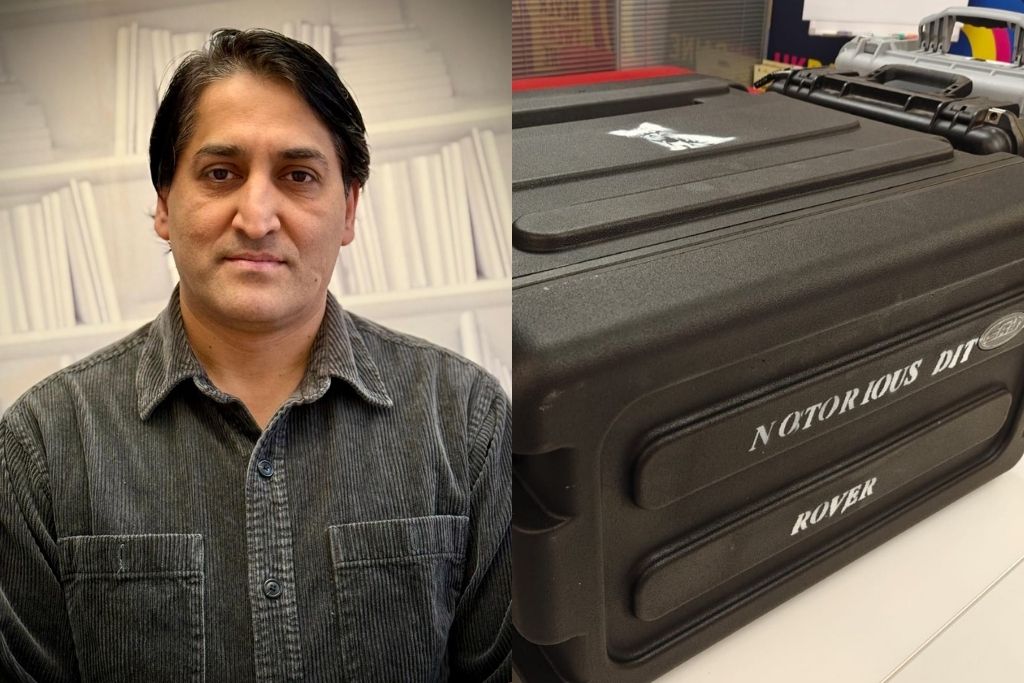
Notorious DIT, part of Molinare Creative Group and the UK’s leading DIT and Digital LAB provider, has announced that it has appointed Ram Tripathi to Production Technology and DI Consultant. Alongside Tripathi’s appointment, the company have launched a roster of new services in answer to the growing demand from productions. The investment in both technology and people come at a time of growth for Notorious DIT and demonstrate the company’s commitment to delivering a client first, gold standard service.
Prior to joining Notorious, Tripathi provided technical guidance, optimised workflows, resolved technical challenges, and contributed to innovative tool development—from on-set colour and data management to post-production workflows. Tripathi racked up a plethora of credits across high-end drama and feature projects as a freelance senior DIT and regular collaborator of Notorious DIT. Now joining the team in a permanent position, Tripathi brings a wealth of expertise in production workflows, digital imaging, and technology solutions. He will be working closely with Notorious DIT’s teams to optimise production processes, implement cutting-edge DI solutions, and ensure seamless technology integration across projects Credits include The Gentlemen, Cleaner, The Third Day and Crazy Rich Asians.
In addition to Tripathi’s appointment, post production veteran, Andy Sumner, joins the team as The Notorious Man in the North, to further support the company’s efforts in the North West following the company’s expansion to Liverpool last year. Sumner will work alongside the Liverpool and Manchester based DITs and LAB operators to support productions.

Further to the team expansion, Notorious DIT have built a new turnkey solution for productions shooting in overseas territories. The new system, called R.O.V.E.R (Remote Offload Verify Export Render), ensures rushes are safely backed up and delivered to the edit while on location, negating the need of a physical person on set. With production budgets tightening, R.O.V.E.R enables productions to implement the required high-end workflows, but remotely. Already having been used on multiple productions, the system marks a new frontier on how productions manage complex overseas shoots.
Alongside R.O.V.E.R, Notorious DIT have added Video Playback to its suite of services, which includes, DIT, data management, LAB and on-set and near-set. Adding video playback to Notorious DIT’s toolbox provides clients with a complete 360 service enabling on-set efficiencies and streamlined communications.
The new services and senior appointments are a result of a positive 2024, despite the challenges faced by the industry. The strengthening of both the team and offerings demonstrate Molinare Creative Group’s commitment to its frontend services, aligning with Notorious DIT’s growth strategy for 2025.
This is the next chapter in Notorious’ story, and I’m extremely excited. Ram’s unparalleled expertise and exceptional talent not only position Notorious with a distinct competitive edge but also elevate the experience we offer our clients, ensuring unmatched results. This, teamed with the expanded services means we are primed for 2025, and further geographical expansions in the coming months.
Michael Pentney, Managing Director of Notorious DIT
Vittorio Giannini returns to Freefolk and Fi Kilroe promoted to CEO
Freefolk has announced that Vittorio Giannini has returned as Director of Business Development and Strategy, and Fi Kilroe has been promoted to be the studio’s first CEO.
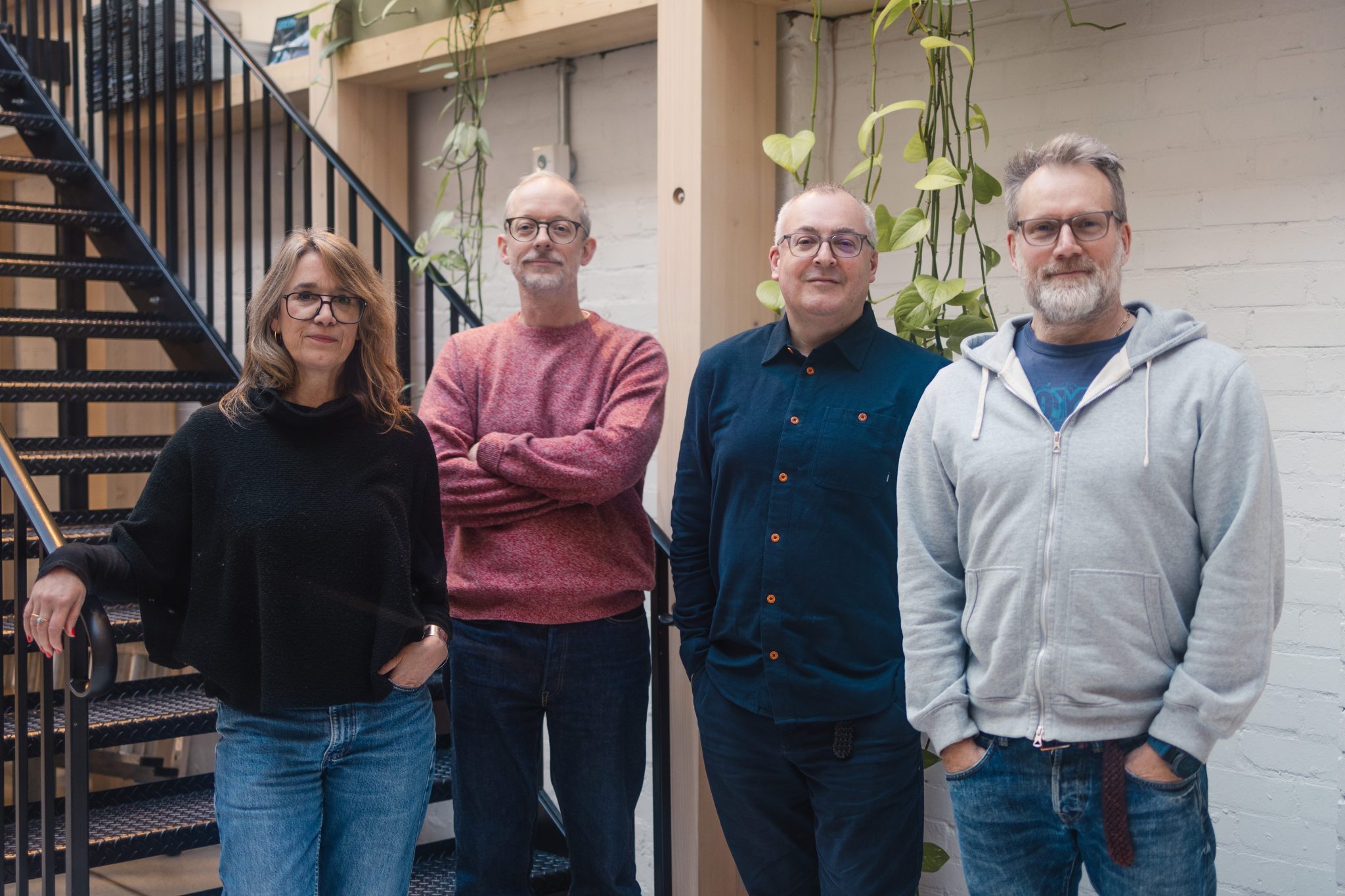
Vittorio and Fi work alongside Freefolk’s Founder and Creative Director Jason Watts and COO Paul Wright, with this new leadership line-up signalling significant growth and development within the business across the advertising, film and episodic divisions.
As a fully independent VFX studio who craft high-end VFX across multiple platforms, I’m hugely proud to say that we have been doing this for 22 years this year. What better way to celebrate this achievement than to have Vittorio back where he belongs and with Fi steering the ship as CEO.
Jason Watts, Founder and Creative Director of Freefolk
Vittorio brings his wealth of experience and industry knowledge back to the Freefolk team.
I had a great time at Omnicom but there was always that part of me that missed the multi disciplined expertise at Freefolk, so when Fi mentioned the focus of this new role, it just made complete sense. Freefolk is all about the perfect balance of culture, experience and great work and, as a truly independent studio, we have the ability to keep that front and centre. I couldn’t be any happier to be back at Freefolk working with Fi, Jason, Paul and the whole gang again. We have exciting plans ahead and some additional key creative hires on the horizon to really position Freefolk onto the next stage of its journey.
Vittorio Giannini, Director of Business Development and Strategy at Freefolk
It’s an absolute privilege to now be CEO at Freefolk, made even better having the strength of this team alongside me. With Vittorio fitting straight back in, it seems like he’s never left!
Fi Kilroe, CEO of Freefolk
Freefolk have just finished work on new projects for FCB/ProdCo and a Wes Anderson feature and are currently in production with Merman, Sky and Paramount+.
Orchard Crew Diary Service announce their Access 2025: Camera Trainees
Orchard Crew diary service, provider of top-tier freelance professionals across the UK, has launched its Access 2025: Camera Trainee cohort.
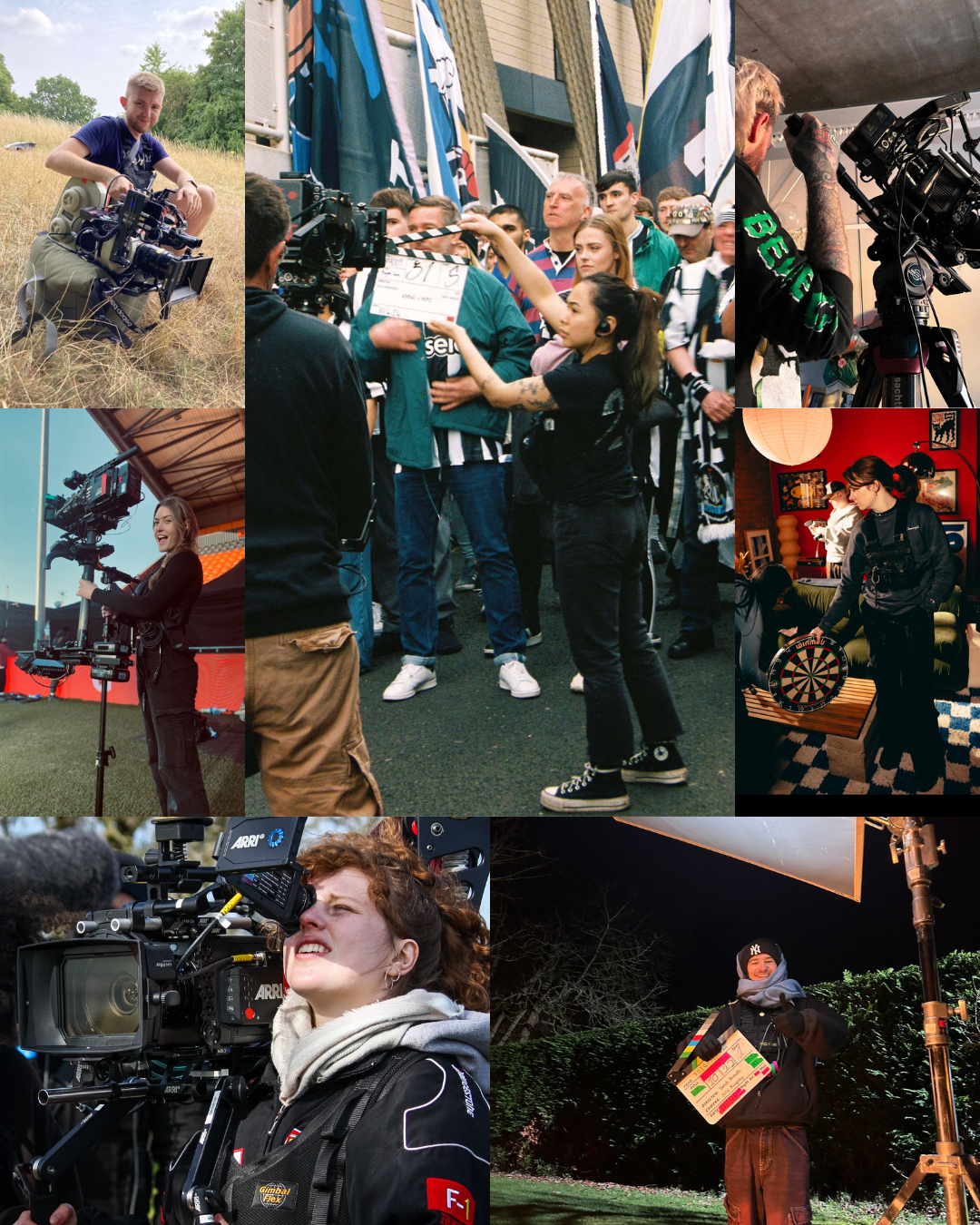
Orchard Crew has announced their cohort of 2025 Camera Trainees: Michael Scanlon, Beth Lamyman, Phoebe David, Alex Sole-Leris, Nic Sian, Thomas Foster and Kim Holmes.
Building on the success of its sister company Digital Orchard Group’s Access 2024: Trainee Scheme, launched last year, Orchard Crew recognised a unique opportunity to champion emerging camera talent. The Camera Trainee Scheme will provide aspiring professionals with the skills, experience, and industry connections needed to excel.
We are thrilled to launch our very own Access: 2025 – Camera Trainee Scheme, providing a dedicated pathway for aspiring professionals looking to advance their careers in the camera department. We saw a fantastic opportunity to expand this support to those passionate about camera work. Nurturing emerging talent is at the heart of what we do, and we are incredibly proud to welcome our talented trainees.
Hannah Drew, Orchard Crew – Diary Service Manager
The Camera Trainee program offers hands-on training in essential camera department skills, including prep, and behind-the-scenes logistics. Offering mentoring and hands-on experience shadowing crew members onset, with the opportunity to gain valuable work experience together with Digital Orchard, MCX and One Stop Films.
Over the next year I aim to continue developing my technical skills within the camera department and prove myself a valuable and reliable asset to any production!
Michael Scanlon, Access 2025 trainee
Trainees will receive ongoing representation throughout the scheme, actively marketed across the brand, while being provided with the necessary resources to connect with creatives. Participants will be considered for available work opportunities, spanning a wide spectrum of production scales.
Orchard Crew’s team are excited to pass on their knowledge through mentorship, and help form the new wave of Camera Department trainees. One of the team’s mentors, Second AC Falco Caldeira is thoroughly looking forward to mentoring.
I wouldn’t be where I am today if it wasn’t for the people that mentored me, so I am really excited to give back and help future trainees find their feet.
Falco Caldeira
Ahead of the official launch of the scheme, Nic Sian (Orchard Crew – Access 2025 Cohort) gained hands-on experience as a camera trainee on a recent production, ahead of the start of the scheme.
I had the best time working with DOP Chaimaa Ormazebal and Orchard Crew’s 1st AC, Luke De Borde on a recent commercial. Both of them took me under their wing, it was a fantastic experience and I hope to work alongside them again soon.
Nic Sian
From the start [Nic] was on top of everything, always ready to help, super switched on, and just really easy to work with. But more than that, they brought such good energy to set. They were funny, relaxed, and just had this way of making everyone feel comfortable […] I’d definitely work with them again any day.
Chaimaa Ormazebal
Digital Orchard announce their Access 2025: DIT & Video trainees
The industry-leader in film and digital workflow services has launched its new Access 2025: DIT & Video Trainees, run through its Orchard Onset department.

Digital Orchard has announced their brand-new 2025 DIT & Video Trainees: Cleopatra Southcombe, Lorna McCoid, Monika Sak, Jack Lightfoot, Adella Demou, and James Lau.
For the second consecutive year, Digital Orchard have successfully launched another Access: Trainee Scheme, which has seen a surge in demand, with applications being six times higher than in the previous year. Founded in 2024 by Head of Bookings, Olivia Fitzsimons, the scheme supports new talent entering the Film and TV industry. It aligns with Digital Orchard’s Foundation, a key advocacy and networking initiative focused on promoting and supporting under-represented groups in the industry.
Managing Digital Orchard’s On-set talent agency revealed a gap in support for new DIT and Video technicians. The Access Trainee Scheme was created to address this, offering hands-on training in a supportive environment. Trainees develop essential skills at their own pace, receive close supervision and feedback, then shadow on set before stepping into paid roles. This initiative is personal to me, as it opens doors for those facing industry barriers, giving them the foundation for successful careers.
Olivia Fitzsimons, Head of Bookings at Digital Orchard
The DIT & Video scheme provides expert guidance on key topics like on-set etiquette, rates, and negotiation, with mentors offering ongoing support. Digital Orchard’s 2024-25 trainees: Tommy Shackles, Madison Marshall, Daniel DiFranco, Christian Chun Kit Wong, and Michalina Wilk, have completed their first year of the scheme. It’s just the start, with many staying on as trainees, and others moving into DIT or Video Assistant roles. Over the past year, the trainees have worked on productions including The Diplomat S3, Mission Impossible: The Final Reckoning, Pressure, Mechanical S3, Vauxhall S4, and Preschool.
In 2025, Tommy transitioned to DIT Assistant roles, already building an impressive CV in just a year and aiming to work on high-end dramas and features.
My first year with the trainee scheme was extremely valuable, it allowed me the time and resources to truly understand the fundamentals of DIT and Video. I had space to practice key skills like coiling cables and setting up transmitters, quickly becoming a valuable asset to Technicians and Operators. I highly recommend the scheme and thank Digital Orchard for the opportunity.
Tommy Shackles
I wanted to express how pleased we all were with Tommy on this production. He’s so lovely to work with and very forward thinking and diligent, so it was a real pleasure having him on the crew. I’d be happy to recommend him on/ have him come aboard whatever I may do in the future.
Jessica O’Shaughnessy, Production Manager
Digital Orchard is thrilled to get their 2025 trainee cohort stuck into another informative programme. Aspiring trainees like Adella Demou are eager to gain hands-on experience in DIT & Video.
I’m excited and extremely grateful to be joining the Access: 2025 Trainee Scheme with Digital Orchard! I look forward to diving into the details of DIT & Video and getting hands-on in training!
Adella Demou
LIGHT looks behind the scenes of Toxic Town
The Light VFX team takes us through their work on the recent Netflix miniseries Toxic Town.
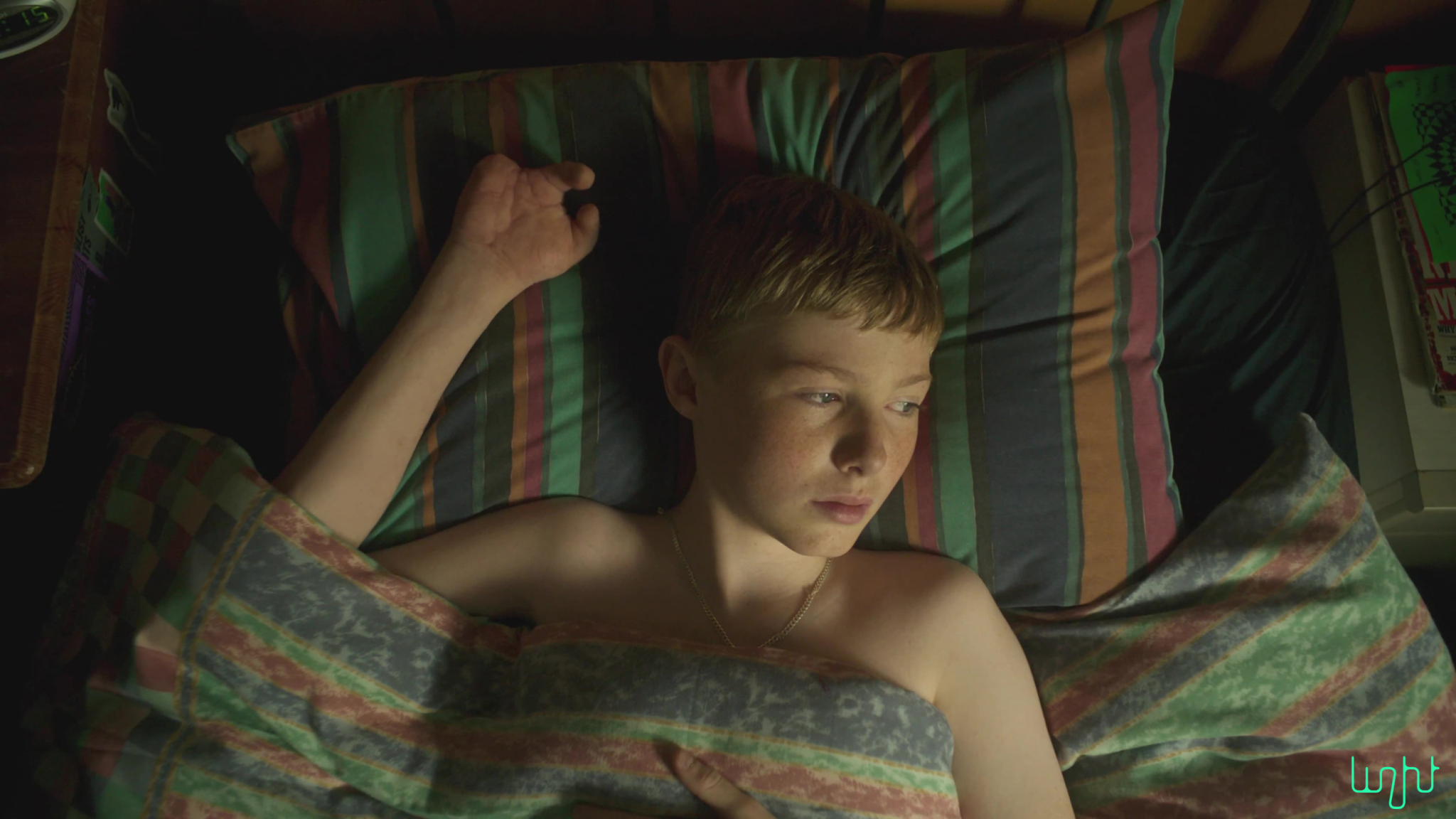
The Corby toxic waste case is a shocking chapter in environmental and legal history, and calling it “the British Erin Brockovich case” highlights the scale of its impact.
When Netflix reached out to our studio about a show based on an actual event, we were instantly drawn by the story. We thrive on direct collaborations with directors as this allows us to develop a clear understanding of the director’s vision. Our initial meetings with Minkie Spiro and the team confirmed that the project was an excellent match for our creative and technical capabilities. Toxic Town allowed us to be involved in every stage of the production process and propose solutions that best enhance the storytelling experience.
Antoine Moulineau, VFX Supervisor
Antoine was engaged as the overall VFX Supervisor on the project and brought fantastic enthusiasm for the project along with creative and technical guidance. Light delivered wonderful invisible VFX work on the project and were collaborative partners throughout.
Daniel Barrow, Senior VFX Manager | UK VFX at Netflix
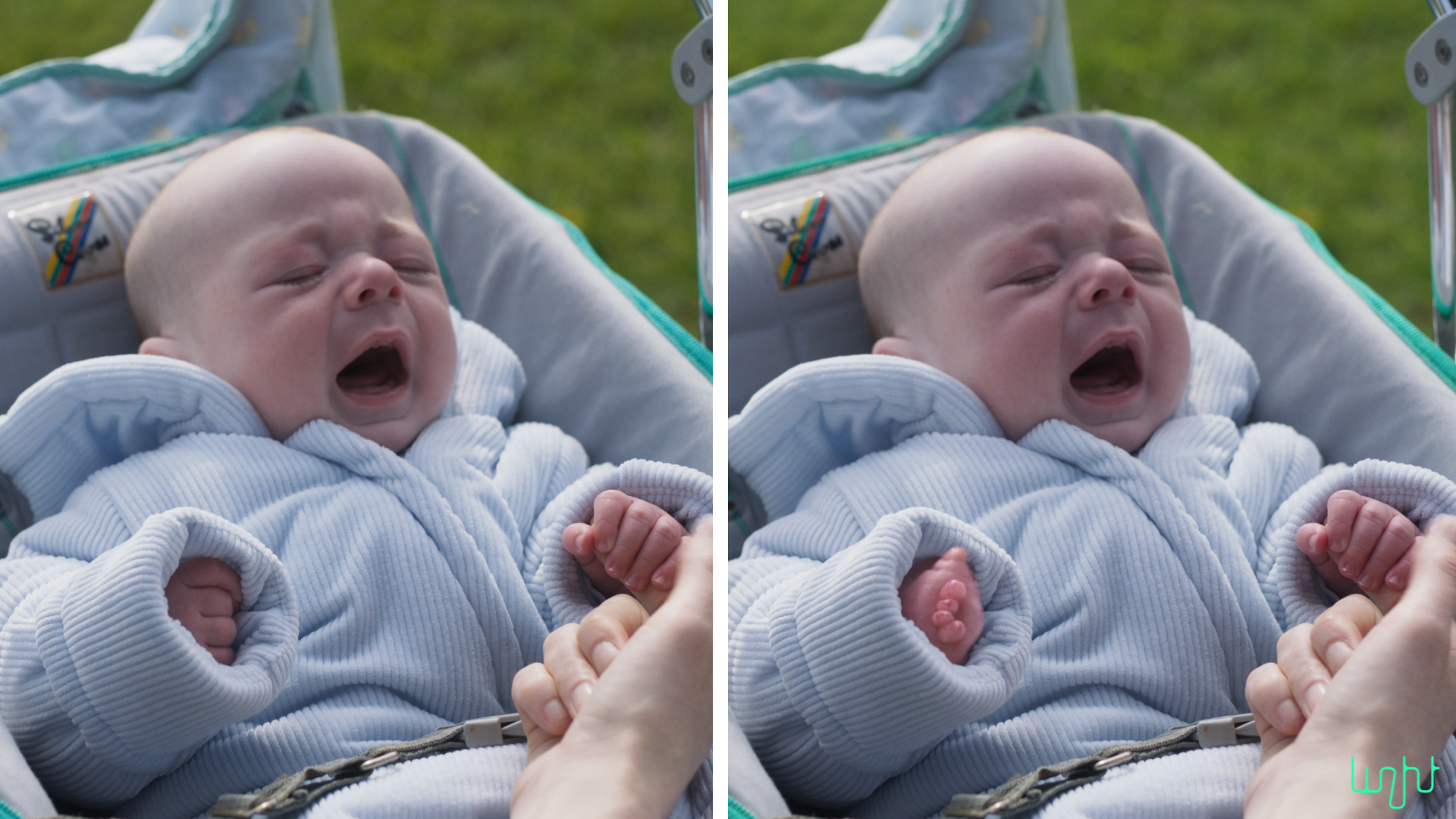
The VFX team faced several challenges while working on the hand adjustments. In some shots, the actor’s hand was inside a glove, so to scale it down, we had to remove the original hand, resize it, and replace it with a smaller version. Additionally, we enhanced the texture and brought it to life through grading.
For shots where the actor moved significantly or gestured frequently, the process became even more complex. Extensive work was required to reconstruct the background and seamlessly integrate the modified hand to better align with the story.
Significant time and effort went into designing and constructing the toxic ponds at both the factory and the disposal site. For one particular shot, we had to reconstruct a large portion to reveal more of the ponds, necessitating a full CG rebuild to extend the scene. This enhancement effectively conveys the vast scale of the waste being removed. The DMP, CG, and compositing work all look outstanding and contribute greatly to the storytelling.
At the disposal site, we had to generate an entirely new landscape from scratch. This was an extensive undertaking, especially considering the camera movement and the resulting parallax effects.
We are proud to have been part of such a profoundly meaningful project. Thank you to Netflix and Dan Barrow, and the dream team Cristina Palmer Romero, Pat Tookey-Dixon and everyone involved.
Oliver Johnstone, Compositing Supervisor
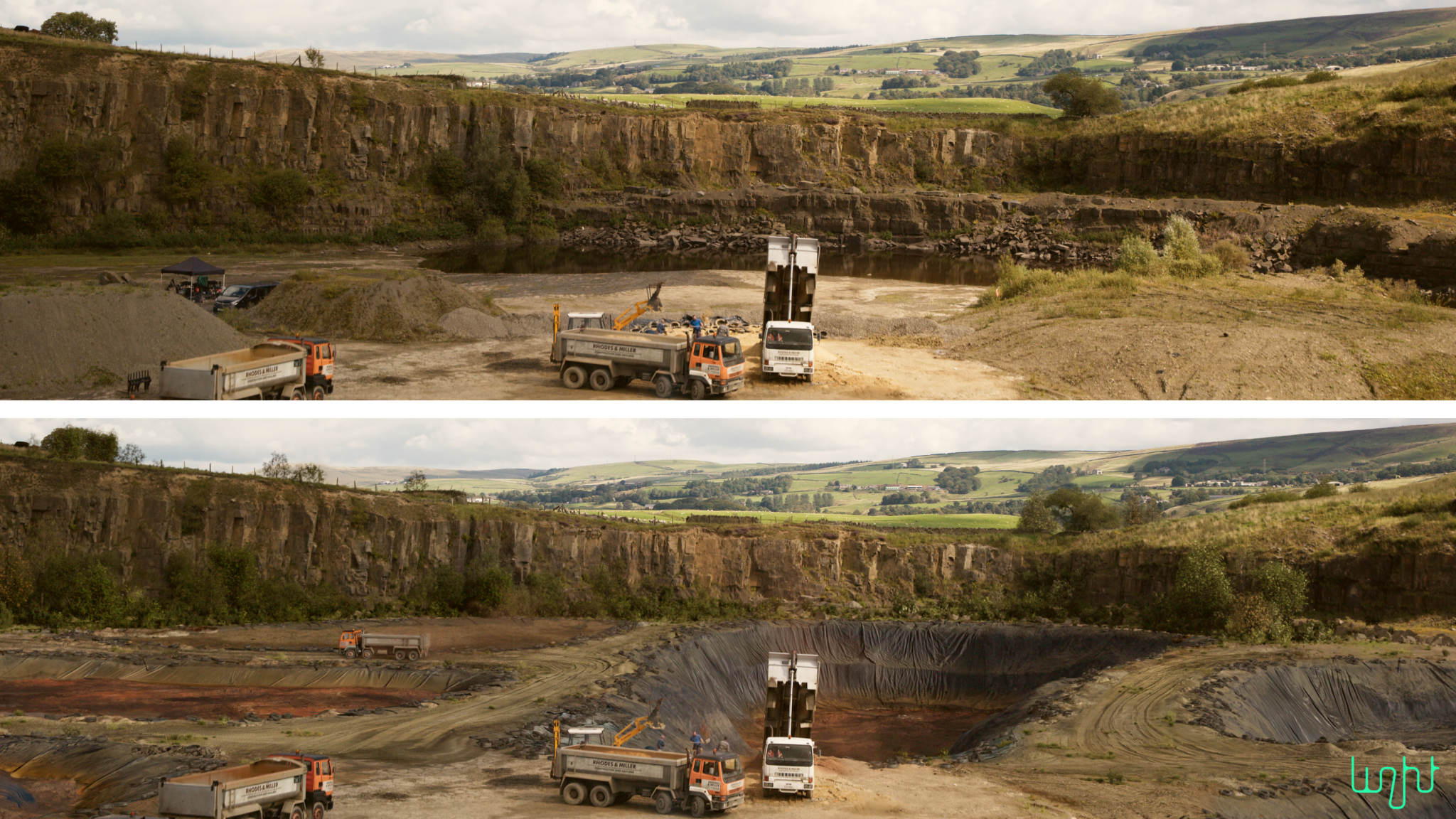
Watch the VFX breakdown reel below.
BlueBolt craft haunting VFX for Robert Eggers’ Nosferatu
Led by overall VFX Supervisor Angela Barson and BlueBolt VFX Supervisor David Scott, BlueBolt created an exceptionally varied range of VFX to support Robert Egger’s dark gothic vision for Nosferatu and match DOP Jarin Blaschke’s unique, Oscar-nominated lighting style.
BlueBolt tackled full CG environments including the fictional city of Wisburg, Orlok’s castle, his ship on a stormy sea, huge swarms of CG rats, extreme blood and gore as well as complex shot stitches across 253 shots. Eggers shot on 35 mm film with unusually long shots of up to 3 minutes and an average of 800 frames, with VFX supporting an astonishing 90 of the film’s 132 minutes.
I have nothing but praise for my collaboration with BlueBolt. Their trademarks are photorealism, naturalism, and subtlety – not maximalism. Their attention to detail is impeccable as well as the drive to never finish until the work is as close to perfection as possible. Above all, BlueBolt’s commitment is to telling great stories. I look forward to working with them again on the next one.
Robert Eggers, Director of Nosferatu
Watch the VFX breakdown reel below.
Freefolk’s Futurefolk back for eighth year
The initiative continues to expand its search to seek talent from non-grad backgrounds.

Spitalfields based, independent, commercials and longform VFX studio Freefolk, has launched its eighth annual Futurefolk competition.
Their initiative to nurture, inspire and kick-start the careers of the next generation of VFX talent with a paid internship launched in 2018, and was created to help build a workforce that reflects the society we live in.
The Freefolk talent team is ready to spot the skill, creativity and enthusiasm required to kick-start the careers of the next generation of VFX stars. And, after a dedicated push last year, Freefolk again wants to hear from people from all backgrounds, those who have, and just as importantly, those who have not taken the university route.
Freefolk Founder and Creative Director Jason Watts explains what they are looking for in the Futurefolkers of 2025.
We are always on the lookout for talented VFX artists and this year we once again aim to search out the more hidden talent, those who might not have a degree or VFX qualification but do have the passion and commitment it takes.
Jason Watts, Founder and Creative Director at Freefolk
Since 2018 Freefolk have welcomed 16 Futurefolkers, who have all gone on to have successful careers in the industry. One of last year’s winners, Nuke Compositor Cerys Steenhuis, is still with the company and has some sage advice for those looking to apply this year.
For anyone looking to apply I’d say, focus your reel and CV on the specific specialisation you are interested in to clearly show employers your skills and the areas you aim to develop. Most importantly, demonstrate your passion for your work and for VFX. Internships are a great chance to grow not just as an artist, but as part of the VFX community.
Cerys Steenhuis, Nuke Compositor at Freefolk
This is a great offer from Freefolk , who have generously opened their doors with this opportunity for future talent. Gaining work experience is incredibly valuable for people aspiring to enter visual effects, so ‘Bravo!’ to Freefolk for once again stepping up.
Neil Hatton MBE, CEO of UK Screen Alliance
Whether you are a budding animator, CG generalist, FX TD or a superstar compositor, you need to compile a two minute reel of your best work to be in with a chance of winning a one-month paid work placement. This can be anything at all that you have worked on that showcases what you can do in either 2d or 3d.
The one month paid internship will involve experience within Freefolk Commercials and Freefolk Film & Episodic, in either the 2D or 3D department. This year’s placement will be hybrid and take place during the summer.
If your talent makes the grade you will be invited to meet the Freefolk team and convince them that you are the right person to win a chance to learn from award winning VFX professionals on both TV and commercial projects.
Deadline for submissions is midnight on 29 April 2025. You can apply via the Freefolk website here.
Cinesite secures a US$215 funding package, signalling confidence in entertainment sector recovery
The Cinesite group has announced a series of transactions which will result in a new long-term funding package of US$215 million to support its continued operations, technological innovation and strategic expansion.

© Smurfs™ & © PEYO – 2025 Lic. Lafig B._IMPS © 2025 Par. Pics.
This significant financial commitment underscores the company’s ambitions and confidence in the entertainment sector.
The funding package empowers Cinesite to overcome the challenges posed by recent industry disruption that has affected the entire sector. The industry will now be considering how best to work with its supply chain to identify, develop, test and validate solutions that deliver more sustainable and robust collaboration between vendors, studios, and filmmakers. Simultaneously, the Cinesite group will continue to expand its production capabilities across animation, visual effects, immersive content and motion capture, while leveraging cutting-edge technologies and exploring the potential of generative AI.
This announcement comes at a pivotal time for the entertainment industry, which has faced numerous challenges in recent years, including the LA wildfires as well as the impact of the Hollywood strikes. The Cinesite group retained as many of its highly skilled artists and technical talent as possible, ensuring its studio network was ready to seamlessly resume production as soon as the strikes concluded. This commitment to talent, while impacting the company’s short-term financials, was crucial to maintaining quality and skilled expertise, allowing the company to continue servicing client projects without further disruption.
Cinesite will capitalise on the growing demand for high-quality entertainment content worldwide while considering strategic acquisitions and partnerships to achieve its medium- and longer-term objectives.

We have served this industry for over 30 years and in that time we have seen many changes; our longevity comes in part from our ability to adapt. In the next phase of our business you can expect to see us taking advantage of opportunities thrown up by the disruption of the past couple of years. Thanks to the renewed commitment of our banks, shareholders and other stakeholders and the ongoing confidence our clients place in our services, we will continue to produce exceptional work for audiences, while fuelling innovation and studio growth.
Antony Hunt, CEO of Cinesite Group
NatWest Corporate Bank led the financing alongside the studio’s long-standing relationship banks Barclays and Santander. Its shareholders, including family office Gryphion, supported the overall package of senior and junior debt and equity lines.
This funding package underscores the conviction of Cinesite’s shareholders and banks in the industry’s recovery and the continued demand for high-quality visual narratives, Cinesite’s strategic market position and growth potential, combined with its ability to consistently produce top-tier entertainment during unprecedented times, made renewing our support a straightforward choice. We are confident in Cinesite’s leadership and their ability to thrive as the broader industry restores its equilibrium.
William Ford, Chief Investment Officer at family office Gryphion
The Cinesite Group is a major player in the visual effects and animation industry, contributing to a wide range of notable projects during its 32+ year history. Its VFX spans blockbuster films like the Marvel Cinematic Universe, James Bond, and Harry Potter franchises, as well as acclaimed television series such as “The Witcher”, “The Mandalorian,” and “Band of Brothers.”
In animation, the studio has delivered films including “Teenage Mutant Ninja Turtles: Mutant Mayhem” and “The Addams Family” series. Cinesite’s upcoming projects include “Warfare”, “Michael” , “G2O” and a new “Smurfs” film. The studio has moved into animated series with productions like “Iwájú” for Disney+, gaming cinematics such as “Invincible: Guarding the Globe” for Ubisoft as well as pioneering immersive content for clients such as the multi-sensory experience Frameless and The National Portrait Gallery. The company’s commitment to artistic excellence and technological innovation has solidified its position as a leading force in the global entertainment landscape.
Harbor’s UK Advertising Division Expands with Sound, Appointing George Castle and James Benn as Creative Directors
Harbor proudly announces the expansion of its UK Advertising division with the appointment of George Castle and James Benn as Creative Directors, Sound. This powerhouse duo brings with them over two decades of collaborative experience across advertising, entertainment and experiential. The team will be joined by Savannah King as Executive Producer Rachel Scott as Associate Mixer.
Known for their innovative approach, Castle and Benn have worked on high-profile campaigns for global brands such as Nike, Apple, McDonald’s, Samsung, Adidas, and Google, as well as feature films, documentaries, and immersive experiences. Their shared passion for sound and commitment to elevating the creative process make them the perfect addition to Harbor’s rapidly growing team.
Harbor’s mission has always been to push creative boundaries and support top-tier talent. Bringing George and James on board is a testament to that commitment. Their deep client relationships and proven ability to collaborate with some of the industry’s top creatives will strengthen our offering and help drive the continued growth of Harbor’s advertising division.
Dan Bennett, Managing Director of Harbor UK Advertising
George Castle, a Creative Director and award-winning Sound Designer, has crafted high-impact work for Nike, McDonald’s, Burberry, Adidas, and Toyota, as well as feature films and immersive experiences. His work has earned multiple Kinsale Shark Awards and Music & Sound Awards Finalist honors, reflecting his creative excellence in sound design. A passionate collaborator, Castle is known for his bespoke soundscapes and ability to bring creative visions to life while fostering a positive, engaging process for clients and teams alike. Recent highlights include sound design for Travis Scott 4×4, Riyadh Season – Esports, and the feature film Last Swim, directed by Sasha Nathwani, which premiered at the Berlin Film Festival and won in its category.
Joining Harbor feels like the perfect next step. We’re excited to collaborate with directors, creatives, and producers to bring bold ideas to life and continue pushing creative boundaries. I’m really excited to see what this team can achieve.”
George Castle, Creative Director, Sound

James Benn, a multi-award-winning Sound Designer and Creative Director boasts a diverse portfolio spanning global advertising campaigns for Apple, Samsung, Ford, Jo Malone, and Google, as well as music videos, documentaries, and immersive experiences. Benn’s recent work includes Google Chrome “MPH vs BPM,” Revolut “Money Possibilities,” and Nike “Closer,” where his innovative approach earned multiple industry accolades including multiple Kinsale Shark Awards and a Merit at The One Show. He is also a passionate advocate for creative inclusivity, fostering environments where talent can thrive.
We’re excited to build on Harbor’s legacy as a powerhouse in entertainment and continue elevating our reputation as leaders in advertising. The opportunity to work with this incredible team, supported by Harbor’s collaborative spirit and cutting-edge facilities, is inspiring. We can’t wait to get started.
James Benn., Creative Director, Sound

Savannah King joins the team as Executive Producer bringing with her a background in integrated production, post-production, and client management. Before joining Harbor, King held roles at leading agencies, including Anomaly, The&Partnership, and Saatchi & Saatchi, where she worked across a wide range of high-profile campaigns for Rimowa, Expedia, Captain Morgan and Toyota.

Associate mixer Rachel Scott brings highly technical sound design experience to high-end advertising and feature films to the team. Prior to joining Harbor, Scott began her career at Grand Central Sound, later joining No. 8, where she collaborated closely with George Castle and James Benn. Known for her technical precision and innovative soundscapes, she has contributed to high-impact projects for Burberry, Pepsi & Women’s Aid.
The new sound team will be based out of Harbor’s Turnmills studio and available to work globally. They will collaborate closely with Harbor’s global creative team to deliver world-class sound for advertising and entertainment projects.
Fatal error: Uncaught Error: Call to undefined function twentynineteen_the_posts_navigation() in /home/forge/www.ukscreenalliance.co.uk/public/wp-content/themes/ukscreen/archive.php:41 Stack trace: #0 /home/forge/www.ukscreenalliance.co.uk/public/wp-includes/template-loader.php(106): include() #1 /home/forge/www.ukscreenalliance.co.uk/public/wp-blog-header.php(19): require_once('/home/forge/www...') #2 /home/forge/www.ukscreenalliance.co.uk/public/index.php(17): require('/home/forge/www...') #3 {main} thrown in /home/forge/www.ukscreenalliance.co.uk/public/wp-content/themes/ukscreen/archive.php on line 41



